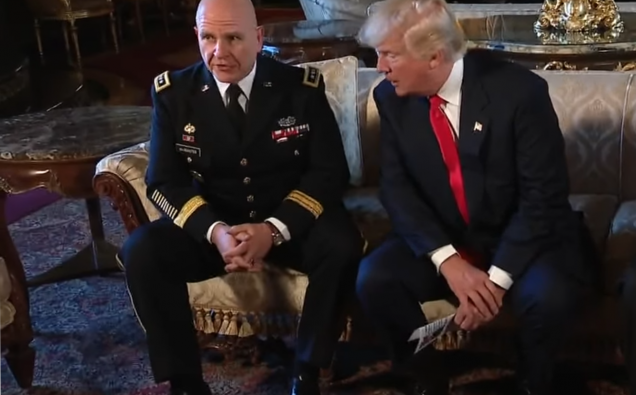
U.S. National Security Advisor Lieutenant General H.R. McMaster discussed cooperative ties with Pakistan’s top political and military leaders on Monday, while emphasizing the need to confront terrorism in all its forms.
On his first visit to South Asia, McMaster traveled to Pakistan from Afghanistan and will also visit India.
His meetings with Pakistani leaders including Prime Minister Nawaz Sharif, Adviser Sartaj Aziz and Army Chief General Qamar Javed Bajwa – marking the first high-level parleys between President Donald Trump’s Administration and Islamabad – take place at a tense time for the region.
While Afghanistan is witnessing a mounting Taliban insurgency and ISIS militancy amid lingering governance issues, Pakistan-India relations have also worsened with Jammu and Kashmir dispute and issue over trial and sentencing of an Indian spy ratcheting up political temperature.
The Trump Administration is in the process of reviewing U.S. policy toward Afghanistan before articulating its strategy to deal with challenges facing the landlocked country, where Washington still has around 9000 troops to assist the Afghan security forces. Last week, the U.S. military used the largest non-nuclear bomb against an ISIS militant hideout.
Meanwhile, Pakistan, which is carrying out a new counterterrorism operation, announced the arrest of a Daesh (ISIS) woman militant. Pakistan also announced that a leader of the Pakistani Taliban leader had surrendered himself to Pakistani military.
After Monday’s meetings, the U.S. and Pakistani accounts of the meetings struck a positive tone.
“NSA McMaster expressed appreciation for Pakistan’s democratic & economic development, stressed the need to confront terrorism in all forms,” the U.S. embassy in Islamabad said.
Prime Minister Sharif’s office said that the Pakistani leader sharing his concerns over the deteriorating security situation in Afghanistan and the continuing impasse, and “conveyed Pakistan’s readiness to work with the international community to explore ways in which the Afghan crisis can be resolved.”
On relations with India, the Prime Minister reiterated his firm conviction on sustained dialogue and meaningful engagement as the only way forward to resolve all outstanding issues between India and Pakistan including the Kashmir dispute, a statement said.
Sharif also welcomed President Trump’s willingness to help India and Pakistan resolve their differences particularly on Kashmir and noted that this could go a long way in bringing sustainable peace, security and prosperity to the region.
“General McMaster conveyed the greetings of President Trump and assured the Prime Minister that the new Administration was committed to strengthening bilateral relations and working with Pakistan, to achieve peace and stability in Afghanistan and in the wider South Asian region,” the statement said.
During the meetings, McMaster was accompanied by David Hale, U.S. Ambassador in Islamabad, Laurel Miller, Acting Special Representative for Afghanistan and Pakistan, Lisa Curtis, National Security Council Senior Director for South Asia and John Jay Wise, National Security Council Director for Pakistan.
On the eve of his visit to Pakistan, McMaster appeared to reiterate Washington’s position that Pakistan must go after all militants without any discrimination.
“As all of us have hoped for many, many years, we have hoped that Pakistani leaders will understand that it is in their interest to go after these groups less selectively than they have in the past,” he told an Afghan TV channel TOLO News, according to reported remarks.
“And the best way to pursue their interest in Afghanistan and elsewhere is through diplomacy not through the use of proxies that engage in violence.”
Afghanistan poses a big challenge for the Trump Administration, with Russia, Iran and regional countries pursuing their own ways to stabilize the country, particularly through support for integration of the Afghan Taliban. China also backs Afghan reconciliation. Moscow is also said to be providing support to the Taliban in fighting the Afghan security forces. The U.S. last weekend skipped a conference Moscow hosted on Afghanistan as U.S.-Russia relations have grown tense over Syrian conflict.
Adding to the complexity, Pakistan and India always compete for influence in Afghanistan.
Kabul says the Afghan Taliban draw their support from safe havens in Pakistan, a charge Islamabad rejects.
Recently, Pakistan traced a number of high-profile terror attacks to militants operating form the Afghan territory including leaders of Jamaat ul Ahrar, which claimed responsibility for a deadly attack on a Sufi shrine. TTP militant Mullah Fazlullah is long known to have a safe haven in Afghanistan.
A few weeks ago, a U.S. drone strike in Afghanistan eliminated a militant involved in perpetrating terror attacks against Pakistan. According a news report on Monday, Afghan ambassador in Pakistan Omar Zakhilwal indicated the Afghanistan and Pakistan could launch a joint operation against Fazlullah in the future.














